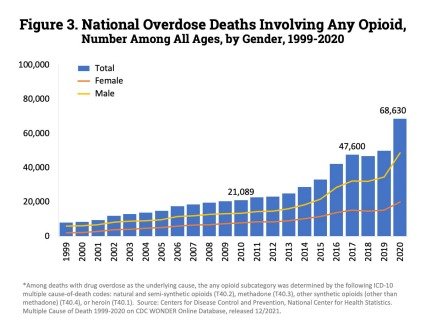Fantanyl
Fentanyl
The Opioid Crisis has devistated communities across the country and around the world. Overdose deaths in the United States involving opioids has increased significantly. The graph below provided by the National Institute of Drug Abuse (NIDA), indicates Opioid-involved overdose deaths rose from 21,088 in 2010 to 47,600 in 2017 and remained steady in 2018 with 46,802 deaths. This was followed by a significant increase through 2020 to 68,630 overdose deaths.
As a nation we have learned pain control medications that contain opioids are highly addictive, even after using as prescribed for a short amount of time. Many adjustments have been made in doctors' offices, pharmacies, and educating the general public about the potential for abuse.
Additionally, approximately 50% (NIDA)of all overdoses involve Fentanyl and is predicted that this number will continue to move upward, prompting people to be more educated and informed about Fentanyl.
What is Fentanyl?
Fentanyl is a powerful synthetic opioid analgesic that is similar to morphine but is 50 to 100 times more potent. It is a Schedule Il prescription drug, and it is typically used to treat patients with severe pain or to manage pain after surgery
(National Institute of Drug Abuse).
Similar to other opioid analgesics, fentanyl produces effects such as: relaxation, euphoria, pain relief, sedation, confusion, drowsiness, dizziness nausea and vomiting, urinary retention, pupillary constriction, and respiratory depression.
(Drug Enforcement Administration DEA).
Fentanyl is being added to other drugs like heroin, cocaine, MDMA (Ecstasy) among others to increase its affect and strength. Some users think they may be using a particular drug and it in reality it is laced with Fentanyl (B. Ramin).
How Addict II Athlete is helping
Addict II Athlete is here to support people who are struggling with opiate abuse including fentanyl. Medication Assisted Treatment (MAT) is the use of prescription medications and therapy for people who suffer from addiction. Medications work to normalize brain chemistry and block the euphoric effect of opioids. Methadone and Buprenorphine are some of the medications used to treat substance use disorders by reducing opioid cravings, sustain recovery, and prevent overdose.
Addict II Athlete supports Medication Assisted Treatment. We also host overdose trainings and teach individuals the signs of overdose as well as provide the overdose reversal drug Naloxone to participants. This opioid reversal drug is a necessary tool to save lives of those suffering from the overdose effects of opioids.
In Summary
Opioid-involved overdose deaths, predominantly Fentanyl, has claimed the lives of thousands of people. Other States have seen significant increases in its use, abuse, and mortality. In Utah, we are seeing increased prevalence of fentanyl, however it isn’t as devastating here as it is in other cities. We are told that the issue is on the rise and we will continue to see more Fentanyl use and overdoses in the years to come. We support multiple pathways to recovery and have resources to treatment options.

